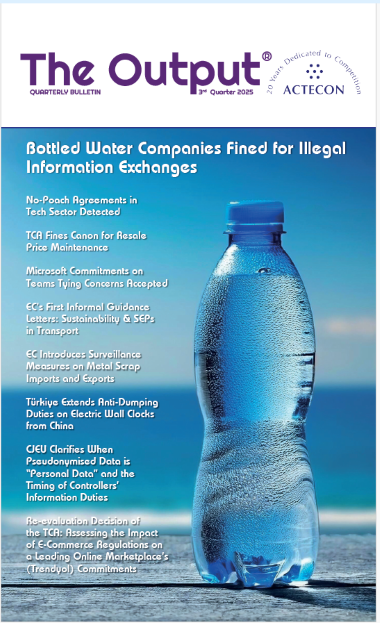Enforcing Competition Law in Labour Markets: A Question of Causality?
| Competition Law

Enforcing Competition Law in Labour Markets: A Question of Causality?
Article by Muhammed Safa Uygur
Turkish Competition Authority (“TCA”) has recently published an announcement on its website regarding the initiation of an in-depth investigation into anti-competitive practices in labour markets[1]. Interestingly enough, the Authority stated in its communication that “Considering the problems in the labour market and the benefits of dealing with such problems with competition law tools, TCA aims to protect the competitive structure of the labour market, being aware of the contribution of workers in the process of bringing together the consumer with products and services, especially in the digital age where creativity and innovative intelligence are prominent.”
The statement appears to be most striking as it refers to protecting the competitive structure of the labour market on the one hand and to “being aware of the contribution of workers in the process of bringing together the consumer with products and services, especially in the digital age where creativity and innovative intelligence are prominent” on the other. There seems to be no contradiction between these two statements at first glance. Nevertheless, as the Authority makes reference to “products and services” and describes how workers contribute to the bringing together of such products and services with consumers, it necessarily draws a distinction between “products and services” and “labour”. Furthermore, the Authority’s specific reference to the “competitive structure of the labour market” but not “product and services markets”, strongly confirms aforementioned reasoning.
The significance of such distinction speaks for itself as the Law on Protecting Competition no.4054 only applies to product and service markets. Therefore, one might simply argue that restrictions on labour markets which would not directly or indirectly affect product or services markets cannot be considered within the scope of the law. Thus, the onus would be on the Authority to prove that such effects exist on product and service markets. However, TCA’s explicit statement on protecting “the competitive structure of the labour market” signals that solving the puzzle will not be that easy. The question thus arises: Is this really still a question of causality in a world where frictions in the labour market, directly or indirectly, restrict competition in product and service markets or are we now living in a different planet where agreements which restrict ‘employer competition’ in labour markets lead to a competition law infringement even if the agreement in question does not affect the competition in product and service markets?
TCA has long been involved in labour markets through different cases. Earlier in its decisional practice, TCA typically provided a causal link between restrictions in labour market and their potential effects in product and service markets. For example in TV Series wage-fixing case[2], the Board held that the alleged agreement amongst competitors would mean that producers were collectively determining the salaries of actors and actresses. In that respect, it made a reference to the wording in Act No.4054 which provides “fixing the purchase or sale price of goods or services, elements such as cost and profit which form the price, and any condition of purchase or sales” as an example for anti-competitive agreements. Thus the Authority hinted at the fact that wage-fixing agreements amongst competitors would amount to a restriction of competition as undertakings determined conditions of purchase collectively.
Another example was a non-transfer agreement where schools agreed on not to make any direct transfer offers to teachers who were employed by the parties to the agreement[3]. The Board stated here that the information exchange on competitive parameters such as fixing school fees, salaries and scholarships could amount to a restriction of competition. Therefore, the Board again made an explicit reference to the fact that information exchange on salary information could be seen as anti-competitive because it was an essential competitive parameter for competing private schools just like any other parameter such as school fees.
In a third decision, the Board put another non-transfer agreement on its focus, this time in a franchising context[4]. In this case, the Board openly embraced the US approach stating that non-transfer clauses between a franchisor and its franchisees would amount to a restriction of competition by potentially causing harmful effects in labour markets. In that regard, this is the first case where TCA makes an explicit reference to the anti-competitive effects in labour markets. However, TCA also states in this decision that in a franchising context, such effects might be counterweighted by efficiencies such as protecting the uniformity of the franchising system, ensuring quality standards and protecting brand image. Therefore, still, the Authority connects labour market restrictions with product and service markets as understood in their conventional meaning.
The Authority’s most up-to-date decision on the issue, İzmir Logistics[5], provides detailed insights regarding its possible directions in the future[6]. İzmir Logistics case is of importance as the case was isolated from a parallel investigation which concerned price fixing and customer sharing allegations for the same undertakings. Thus the case only concerned wage-fixing allegations independently of their consequences in product and service markets. The Board decided in this case that “wage fixing agreements infringe competition law not only because they constitute buying cartels but also because of their direct anti-competitive effects on labour markets.”
In light of the foregoing, TCA’s point of view on the issue reflects a degree of an independent assessment of anti-competitive effects on labour markets rather than assessing labour restrictions’ effects on product and service markets as understood in their traditional sense. However, the said approach is still surrounded with uncertainties as up to this date there has been no judicial review regarding the issue. Nevertheless, one thing is for sure: the current in-depth investigation will be watched closely by many as it will most certainly clarify many of these questions.
[1] TCA, ‘İşgücü Piyasasına Yönelik Centilmenlik Anlaşmaları Nedeniyle Türkiye Genelinde 32 Teşebbüs Hakkında Soruşturma Açıldı.’ <https://www.rekabet.gov.tr/tr/Guncel/isgucu-piyasasina-yonelik-centilmenlik-a-d8bc3379bea1eb11812e00505694b4c6> accessed 23 April 2021.
[2] TV Series Case, (05-49/710-195, 28.07.2005).
[3] Private Schools Case, (11-12/226-76, 03.03.2011).
[4] Bfit Case, (19-06/64-27, 07.02.2019).
[5] Izmir Logistics Case, (20-01/3-2, 02.01.2020).
[6] For full disclosure, the author of this article took part in the said investigation as a former TCA case handler. To best of his knowledge, the case is now fully closed. The author also would like to state that he has no connection with TCA at the time of writing this article.






